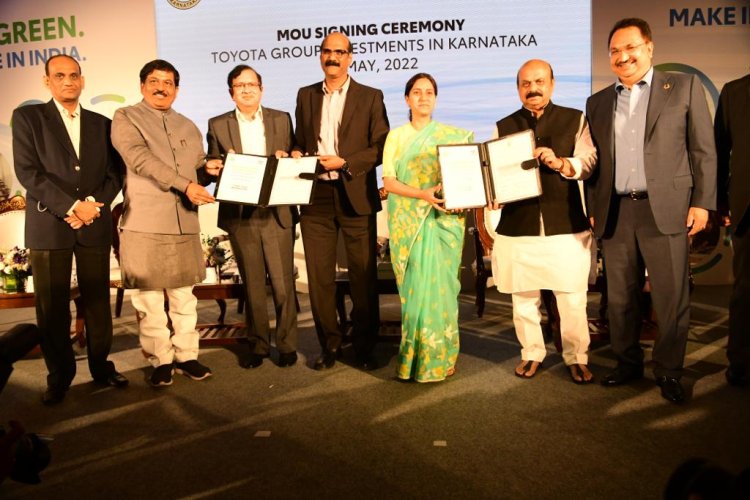Toyota Signs MoU with Government of Karnataka for Big Investments
In its effort to contribute to the country’s vision of “Make in India” and to enable a faster reduction in carbon emissions, out of the total investment of INR 4,800 crores, the Toyota Group of Companies that constitutes of Toyota Kirloskar Motor and Toyota Kirloskar Auto Parts, has announced their Memorandum of Understanding (MOU) with the Government of Karnataka to invest INR 4,100 crores. This announcement coincides with Toyota Kirloskar Motor’s 25 years of successful journey in India, by winning the hearts of millions of happy customers.
In addition to boosting the local manufacturing eco-system, the new development will provide an impetus to employment generation and local community development. This investment will also spur the growth of the local supplier base and hence result in higher investments and further job creation.
The MoU was exchanged between Hon’ble Chief Minister of Karnataka Shri Basavaraj Bommai and Mr. Vikram S. Kirloskar, Vice-Chairman, Toyota Kirloskar Motor, in the presence of Dr. Murugesh R. Nirani, Hon’ble Minister of Large & Medium Industries, Government of Karnataka, Mr. Ravi Kumar, IAS, Chief Secretary of Karnataka State, and among other dignitaries present at this momentous occasion of MoU Signing Ceremony.
As part of the MoU, Toyota Group of Companies will systematically invest towards making India a self-reliant manufacturing hub, thus contributing to the Government’s Make in India and Atma Nirbhar Bharat mission. The investments are aimed at promoting greener technologies that will help lower dependence on fossil fuels and mitigate carbon emissions.
This investment will also enable local production facilities to build electric powertrain parts and components, thereby catering to the electrified vehicle manufacturing in India. As a part of the Toyota Environmental Challenge 2050, Toyota will continue to focus on reducing carbon emissions in a holistic manner going beyond tailpipe emissions to address manufacturing and lifecycle CO2 emissions in order to realise its carbon neutrality goals by 2050, as announced earlier.





